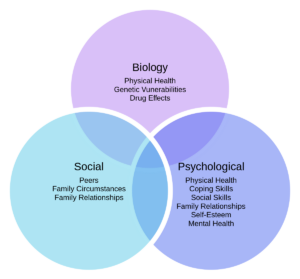[vc_row][vc_column][vc_column_text]
The Psychological Model of Addiction
Addiction is a complex problem that can have a devastating impact on individuals, families, and communities. There are many different factors that can contribute to addiction, including genetics, personality, and environment. However, one of the most important factors is how people cope with difficult emotions.
What is the Psychological Model of Addiction
The psychological model of addiction views addiction as a problem of emotional regulation. People with addictions often struggle to cope with difficult emotions in a healthy way, and they may turn to substances or behaviors to numb their emotions. This can lead to a cycle of addiction, where the person becomes dependent on the substance or behavior to cope with their emotions.

Conflict Of The Mind
There are two main ways that people with addictions experience emotions:
- Intense emotions: Some people with addictions may feel emotions intensely. They may feel anger, sadness, anxiety, or fear so strongly that it feels overwhelming. This can lead to impulsive behavior, such as substance abuse or self-harm.
- Numbness: Other people with addictions may feel numb to their emotions altogether. They may not feel anything, even when they are experiencing a difficult situation. This can be a way of coping with difficult emotions, but it can also lead to problems in relationships and work.
You Are Not Alone In These Feelings
“The important thing to remember is that no matter where you are on the spectrum, whether you feel emotions intensely or not at all, the issue is the same. You are numbing your emotions to cope with difficult feelings. I feel nothing because my mind has numbed my emotions for me.
As humans, we are amazing at cutting off painful emotions. It happens unconsciously, without us actually planning to do it. And so, no matter where I am on that spectrum, the problem, the core issue, is the same: I have emotions that are overwhelming, and I can’t see them or feel them. I can just kind of see them.“ – Dr Eli K
“There are people that can’t stand with feelings, let’s say loneliness and rejection and abandonment. Like those feelings are just way too intense. You’ve got these deep feelings of loneliness and rejection and abandonment down there, which is really painful. So, you like getting into a relationship because who wants to feel lonely? So, you meet someone, and you connect to them, and then want to get closer to them. You start getting closer and closer, and all of a sudden, fear comes up inside. Anxiety. Why? Because if they reject me, if they don’t like me, then I’m going to end up feeling lonely and abandoned again.” – Dr Eli K
We Are Realist With Your Goals
The goal of treatment for addiction is to help people find a healthy balance between feeling and not feeling emotions. This can be a challenging process, but it is possible with help from a therapist or counselor. Treatment may involve a variety of approaches, such as therapy, medication, and support groups.
If you are struggling with addiction, it is important to remember that you are not alone. There are people who can help you. There are many resources available, such as treatment centres, support groups, and hotlines. It is important to reach out for help if you are struggling with addiction.
How to Find Recovery In Melbourne
If you are struggling with addiction, there are a few things you can do to find recovery:
- Acknowledge that you have a problem: The first step is to acknowledge that you have a problem with addiction. This can be difficult, but it is essential to start the recovery process.
- Seek professional help: There are many different types of professional help available for people struggling with addiction. A therapist or counselor can help you understand your addiction and develop a treatment plan.
- Join a support group: Support groups can provide you with a safe and supportive environment to share your experiences and learn from others.
- Make lifestyle changes: In addition to professional help and support groups, you may also need to make some lifestyle changes to support your recovery. This may include changes to your diet, exercise routine, and sleep habits.
Recovery from addiction is a journey, not a destination. There will be ups and downs along the way, but with hard work and dedication, you can achieve lasting recovery.
Malvern Private Hospital Has Proven Experience
Malvern Private Hospital is Melbourne’s leading treatment centre for addiction. The hospital offers a comprehensive range of services, including inpatient and outpatient treatment, therapy, medication, and support groups. The hospital’s team of experienced professionals is dedicated to helping people overcome addiction and achieve lasting recovery.
See our anonymous testimonials
If you are struggling with addiction, please reach out to Malvern Private Hospital for help. The hospital can provide you with the support and resources you need to find recovery. [/vc_column_text][/vc_column][/vc_row]
